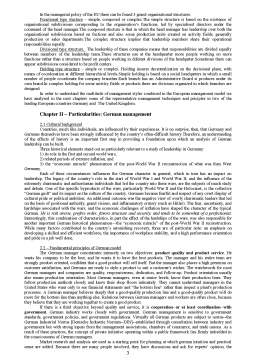Extras din proiect
Countries, much like individuals, are influenced by their experiences. It is no surprise, then, that Germany and Germans themselves have been strongly influenced by the country's often-difficult history.Therefore, an understanding of the effects of history is an important first step in providing a foundation upon which an analysis of German leadership can be built.
Three historical elements stand out as particularly relevant to a study of leadership in Germany:
1)its role in the first and second world wars,
2)related periods of extreme inflation, and
3)the "economic miracle" phenomenon of the post-World War II reconstruction of what was then West Germany.
Each of these circumstances influences the German character in general, which in turn has an impact on leadership. The legacy of the country's role in the start of World War I and World War II, and the influence of the extremely charismatic and authoritarian individuals that led the country into these wars, are the subjects of much study and debate. One of the specific byproducts of the wars, particularly World War II and the Holocaust, is the collective "German guilt" and its impact on the culture of the country. Germans became fearful and suspect of any overt display of cultural pride or political ambition; An additional outcome was the negative view of overly charismatic leaders that led on the basis of positional authority, grand visions, and inflammatory oratory (such as Hitler). The fear, uncertainty, and hardships associated with the wars, and the economic challenges of inflation have shaped the character of the typical German. He is risk averse, prefers order, favors structure and security, and tends to be somewhat of a perfectionist. Interestingly, this combination of characteristics, in part the effect of the hardships of the wars, was also responsible for another important German historical phenomenon-the "economic miracle" of the post-World War II reconstruction. While many factors contributed to the country's astonishing recovery, three are of particular note: an emphasis on developing a skilled and efficient workforce, the importance of workplace stability, and a high performance orientation and pride in a job well done.
-Fundamental principles of German model
The German manager concentrates intensely on two objectives: product quality and product service. He wants his company to be the best, and he wants it to have the best products. The manager and his entire team are strongly product oriented, confident that a good product will sell itself. But the manager also places a high premium on customer satisfaction, and Germans are ready to style a product to suit a customer's wishes. The watchwords for most German managers and companies are quality, responsiveness, dedication, and follow-up. Product orientation usually also means production orientation. Most German managers, even at senior levels, know their production lines. They follow production methods closely and know their shop floors intimately. They cannot understand managers in the United States who want only to see financial statements and "the bottom line" rather than inspect a plant's production processes. A German manager believes deeply that a good-quality production line and a good-quality product will do more for the bottom line than anything else. Relations between German managers and workers are often close, because they believe that they are working together to create a good product.
If there is a third objective beyond quality and service, it is cooperation--or at least coordination--with government. German industry works closely with government. German management is sensitive to government standards, government policies, and government regulations. Virtually all German products are subject to norms--the German Industrial Norms [Deutsche Industrie Normen--DIN]--established through consultation between industry and government but with strong inputs from the management associations, chambers of commerce, and trade unions. As a result of these practices, the concept of private initiative operating within a public framework lies firmly imbedded in the consciousness of German managers.
Market research and analysis are used as a starting point for planning at which german intuition and practical sense are added. Because there are many people involved, they have discussions and ask for experts' opinion, the planning activity is pretty long, the final decision is taken through consensus, and the degree of risk they implicate is minimum. When the decisions are taken they are implemented quickly. Because of the high degree of avoiding uncertainty, which chracterizes Germany and German companies, ambiguity or risk are hard to tolerate among the employees.
Preview document
Conținut arhivă zip
- Cultural Influences In The Management Of The European Union.doc









